- Home
- Sherwood Smith
Fair Winds and Homeward Sail: Sophy Croft's Story Page 12
Fair Winds and Homeward Sail: Sophy Croft's Story Read online
Page 12
. . . when the rain clear’d there were two Frenchmen, the first within range of long nines. Capt. Algernon was Dumbfounded, for he had not believ’d me, though I had predicted it at the outset. Perhaps he thought that by insisting the 28 was a neutral American it might make it true, though I had seen from the Rigging before the squall was upon us that this was no American.
I am sorry to say that in the subsequent Broadside he was the first to die, but at he was carried off so sudden I do not think he had time but to be surpris’d. Command now falling to me, I was able to order our own Broadside, for I had instructed the gun captains to see that we were treble-shotted, and a dose of Cannister caused the Frenchman to fall off before the Squall was upon us again.
We being effectively invisible, and I knowing exactly where we lay in reference to the Islands, I proposed a Ruse. I must stop here to add that the officers were to a man Nobly in Support of it, however dangerous it sounded.
And so, the dark falling, we had Dous’d all our lights and thrown Canvas over everything, as we sailed in what I trust’d to be a position roughly between the enemy ships. When the rain was in clearing, having found ourselves got into proper Position, all tarpaulins over the lanterns and lights were hove off as if by magic, and we luffed to the wind on the Starboard tack, pouring a Broadside into the lead ship before the second could round to.
After half an hour of hot fighting, the first Struck to us, the second listing badly and all but sinking; her masts had gone by the board entirely.
We now found ourselves in a Position with roughly three times the prisoners as we had crew, but they were in the main wounded, aboard ships in danger of foundering. Thus my Prize crews must be sparse. The crew going to the most dangerously damaged ship was headed by our third lieutenant, Harville, a man both zealous and brave. Under his firm and steady command, the French threw down their arms and commenced knotting and splicing.
Still, it might have been touch and go, for I did not trust them to keep their Word beyond the immediate danger. What indeed was to keep them from a general mutiny once they had a mast fished, and the shot below the water plugg’d?
But however at that Moment the Dolphin, 74, hove up and saw the Situation at once. To be sure, once the French captain aboard me saw the Dolphin, he sigh’d, and cursed in French, and my suspicions were confirm’d but as I tried to say something, my tongue was curiously leaden, and next thing I knew, the deck had leap’d up to meet my face. When I woke, it was to discover I had taken a wound that I had not notic’d and had lost a deal of Blood.
Though I feel as right as Rain, the admiral has sent me to carry the Dispatch back to London, and granted me liberty beyond that to Recover, saying that this ought to gain me my step at Last.
And so, by the time you get this, I expect to be in Monkford with Edward. We shall Unite in writing to you once I am there.
Your obedient brother (soon, I trust to be called Captain)
Frederick
o0o
My dear Sister:
By now you ought to be well established in Bermuda, where I expect that Admiral Croft is comfortably established as Port Admiral. Frederick is here, and I believe I may fairly state that his health is good. He suffered from Headache at first, though he would deny it, but that has gone off, perhaps in part chased away by the good company in which we find ourselves.
Dr. Hopgood is kindness himself in encouraging us to mingle with the society here. We have got in with a pleasant set of people. There are assemblies in plenty, and it would do you good to see Frederick looked up to by all the young ladies of this parish and the next. He is a great favorite, invited everywhere. He smiles at everyone, and is agreeable but if I were hard pressed to say he has a favorite, I suspect it would be for a Miss Elliot of Kellynch Hall, which is the seat of Sir Walter Elliot.
More I will not say, but let Vergil say it for me, Audentis Fortuna iuvat; he must write himself, but I will add only this. His promised visit of a month has stretch’d to three months, in part because Whitehall has promis’d him a new ship that is now finishing on the docks, and is said to be readying for launch next Spring. He may, as far as I am concerned, stay as long as he likes. No doubt he will tell you more when he knows it.
Your loving brother, Edward
o0o
Frederick Wentworth scraped impatiently at his chin, the water barely lukewarm. Any hour not spent in Anne’s company was an hour wasted.
He peered at himself in the clouded looking glass propped on the shelf over the washstand in the Hopgoods’ small guest chamber, then shook his head. What could an Anne Elliot—gentle, elegant, well-read, and above all true—see in him?
But so it was! So it had been from the very first meeting. She had caught his eye immediately, so great a contrast she made against the shrill voices of the other girls, the fan-flirting and arch poses. Anne glided quietly like the finest cutter, sails aloft and alow, where all around her minced like over-gilt Dutch traders masquerading as royal yachts.
No, that was scarcely just. He had watched the other fellows exchanging sallies about divine fairs, and being slain with a glance, and throwing in bits of poetry the way he exchanged broadsides with a weatherly French frigate. It was all in how you were bred up, he supposed, but somehow Anne had escaped becoming a haughty stick like her elder sister (met only the once, and that was enough!), or that cold-eyed Lady Russell.
While others chattered idle nonsense and fluttered eyelashes and fans, Anne asked about his experience, and listened with unfeigned interest. In her turn she shared poetry and prose that raised honest sensibilities about honest things. Every time he saw her, he had thought of a hundred new things to say, and so had she.
It was entirely too quiet to be called a courtship, he reflected. He had certainly not set out to find a wife, no more than he believed Anne had set her cap at him, but somehow he had by degrees discovered that he could not bear to think of days without her in them.
“Anne, will you marry me?” He had put his question to her in the course of one of their walks, and he received an honest answer, tranquil but with conviction, as happiness glowed in her smile, her cheeks, her eyes. No parade, no fainting, no dramatic declarations. They had parted with mutual promises, and every day since he had told her what she might expect as a sailor’s wife—and she had listened with all her attention.
They were to be man and wife, and yet it did not seem quite real. Perhaps because of his sense of liberty running out. He wanted everything settled—bowsed up tight—before he set sail.
He pulled on his single civilian coat, which he knew was at least two years out of fashion—the cuffs all wrong, the short front somehow different from the other coats he saw around him—but it had plenty of good wear left, and anyway, Anne had accepted him. Not his dress.
He hurried down to the dining room, where he found Edward with Dr. Hopgood, each with a book by his plate, the rest of the family having vanished earlier in their various duties. Both looked up, their spectacles twinkling; Frederick suppressed a laugh, wondering if his brother would resemble the good doctor in twenty years.
And what of it, if he were happy, he thought as he helped himself to toast from the rack. I suppose I shall look like Nelson did at forty-three, maybe with a missing leg instead of a missing arm, one-eyed, but Anne will stand by me the way she stands by me in my old coat.
It was a comforting thought, but underneath it he sensed an increased urgency: he was, in a sense, arguing with himself. Why? They both knew what they wanted, and yet somehow the engagement—so real when they were together—felt unanchored when they were apart.
Was it because he had no family save Sophia (far away) and Edward busy with his curate’s duties? Aye, he was onto something, he thought as he stepped into the lane, tipping his hat to acquaintances going about their day. When betrothals were made, were there not supposed to be meetings of the families?
The grand Elliots had never returned his call after his single visit to Kellynch Hall, at
Anne’s request, so that she could present him to her family. He’d been glad of it, for a more unpleasant morning he had scarcely spent outside of battle.
That was it! They hadn’t returned the call, and so there had been no invitations either way. Only in the last few weeks had Frederick begun to comprehend some of invisible rules that everyone seemed to know, much like shipboard custom: during those dreadful first days as a reefer he’d had to learn the hard way that on one’s first coming aboard one saluted the quarterdeck.
Sophia and Croft had settled their marriage between themselves, had not they? He tried thinking back. Then he recollected Croft aboard the wreckage of his ship after the Battle of the Nile; he had said something or other about asking Frederick’s blessing.
That was it. He’d neglected a custom, like saluting the quarterdeck. That threw him back to his boyhood, and a vague recollection of a story their mother had told about their father having had to apply to an uncle for permission to marry Mother. “And lud! There I was rising forty, and my uncle—from a second marriage, you’d recall—ten years younger than I!”
Surely Edward was familiar with these customs. Why had not Edward mentioned this one? But he was still young in so many ways, and very unworldly. He knew of the engagement—he had drunk a glass of sherry with Frederick in celebration—but he might not have given it a thought beyond that. As for Anne, perhaps she assumed he knew, and delicacy prevented her from mentioning it.
All that was immaterial. Now that he had recollected it, he knew his duty. He was going to have to present himself at that ice-cold barrack in Kellynch, and address himself to Sir Walter.
He grimaced, but he would face any manner of unpleasant duty for Anne’s sake.
He crossed the village square with impatient strides, and smiled when he spied Anne’s familiar form at the gate to the orchard grove where they customarily met to take their walks. His words—“I’ve been thinking that I must call on your father in form?”—died on his lips when she raised her face, and he saw within the frame of her bonnet that she had been weeping.
His heartbeat quickened as he hastened to close the distance between them, hands out. She reached for him—one warm squeeze palm to palm—then her fingers lifted away. His heart thundered painfully against his ribs. “Anne?”
“I—I am to tell you that it . . . our engagement . . . is off.” She barely got the words out before she closed her eyes, her shoulders trembling as she pressed her handkerchief to her face to hide the anguish she could not suppress.
“What have I done?” Frederick swayed on his feet as if he had taken a shot of canister to the chest. “What have I said? I knew it, I was thinking this very morning, I ought to call upon your father. I do not know the proper forms—”
She shook her head. “He might not receive you,” she whispered. “He is quite angry with me, saying I have thrown myself away on . . .”
Her lips pressed together as fresh tears flowed.
Frederick sighed. He had heard plenty about Sir Walter, and none of it good. Toplofty humbug, a careless landlord, a tiresome neighbor always standing on ceremony as if he were the Emperor of China.
Once again Frederick closed the distance between them, but forbore taking Anne in his arms, though they ached to hold her. For she held herself a little away, but as a sob shook her frame, he could not keep himself from touching her hand.
Her fingers turned and gripped his as he said, “Perhaps we ought to go to your friend Lady Russell. She appears to have influence—”
Anne shook her head, and stepped back. Frederick let her go free, though it hurt him to do it—he wanted so badly to hold her, comfort her, reassure her.
Anne stood a pace away, eyes averted so that all he saw was her bonnet, and the edge of one wan cheek, her hands clasped tightly against her. “She was with my father. In the parlor. When they told me I cannot . . .” She shook her head again, too overcome to speak.
“They gave you reasons, I trust?” he asked, the numbness of shock melting into the heat of anger.
She could only nod, still weeping. But she could not bring herself to speak the words.
And he did not have to hear them. His birth was good enough to enable him to become an officer, but that was nothing to the likes of Sir Walter and Lady Russell. No exalted birth, no fortune to wash away the stain of not being born to another spendthrift baronet or wool-witted knight.
“Let’s run away,” he began, but when he saw her stiffen, and the fright in her honest eyes, he knew they were the wrong words.
But they should be the right words. “So you’ve chosen between us,” he said angrily.
She drew in a shuddering breath, her soft, dark gaze painful in that dear face now pink and blotchy from many hours of weeping alone and in silence. “You are honorable,” she whispered. “It is one thing I love about you, one of many . . . you strive to do your duty . . . And so must I.”
Her duty was to throw him over for a parcel of puffed-up popinjays?
“I thought our duty was to one another,” he began—but he remembered his earlier desire to have his affairs expeditiously settled before he reported back to Portsmouth.
To say that he had a duty to his profession, but that she owed duty to him, were the words of a coxcomb. He could not speak them. It was for her to speak them, if she truly loved him. Could she really choose duty to those people who cared nothing for her, over him? His own anguish ignited the flames of anger.
He stepped back, and when she remained silent, trembling from head to foot, fury leaped higher. He stepped away from her, willing her to close the distance, to put out her hand, to promise . . . what? He met her imploring gaze, and both stood there breathing hard; when she vouchsafed no word he turned his shoulder and walked off, his single impulse to put as much distance between them as he could.
CHAPTER FIFTEEN
Sophy leaned in the open window, breathing the delightful scent of citrus blossoms as she watched a pair of bright orange flamingos parading past the profligate beauty of wild orchids. When she heard her husband’s step behind her, she turned away from the window.
“Dearest,” she said, holding out her hand.
He closed his fingers around hers, and came to join her at the window. “I know how much you love it here, Sophy.”
She did not miss his tone. “Are we off then?” Regret suffused her, but then, she reflected, a change of scenery would be exciting.
“It is the East Indies this time,” he acknowledged. “But to console you, here is a letter.”
“Frederick, at last? What will you wager? Captaincy or marriage?”
“Both, if he gets what he deserves.”
Sophy found that answer excellent, and rewarded him with a kiss as her fingers broke the seal. The handwriting was nearly unreadable. She brought the paper closer to her eyes, and exclaimed in a low voice, “Oh, drat.”
“What is it? Did I bring you bad news?” the admiral asked, his smile fading.
Sophy held out the letter.
. . . I hope and pray this reaches you before Frederick does, for I would not for the world have his sensibilities lacerated by any of what I know would be well-meant teasing.
He insists it is nothing, he pays it no mind, he only wants to be in service to the kingdom.
No one has said anything, least of all Frederick, but from what little I can glean, though he was briefly engaged—the lady had accepted him—it is now all off.
He quit Monkford abruptly, saying that he would not wait, he would accept the first thing offered, and sail as far as may be. As the newspapers report ships being sent near you, I fear he may be on his way thither—he wrote to me briefly, only to say that his orders had arrived, and he is now the commander of an older ship call’d the Asp.
I write this in a hurry, in hopes it gets there before he does. I hardly know what I write, I am so distressed on his behalf.
In haste—
Edward
Sophy lowered the letter.
&
nbsp; “Well, at all events, he is a captain at last! It is a vast shame that his step should come hard on such a disappointment. As he did not arrive with the packet, should we wait?”
The admiral shook his head and smiled. “These young fellows, their flirtations are so often here today and gone tomorrow. He is new to such matters. Let us hope that he finds someone else ere long—at least he has gained his step, as you rightly say, and so he has something better to think about. Captain Wentworth! It hath a fine ring to it, does it not?”
When he saw that this did not satisfy Sophy, he ceased the tone of banter. “We can wait if you so desire, but I feel obliged to point out that this is your brother, who is the best fellow in the world, not to mention the bravest and most honorable. But he is also very private, especially in the sensibilities line.”
“Oh, yes. I know what you mean,” Sophy declared. “When Mama died, he would not let us see him weep, though Edward and I were both watering pots. And he just a boy.”
The admiral nodded. “You know I do not set myself up for understanding, for I haven’t the quick eye you have, my love. But you cannot spend years in the company of a man without coming to know him a little. I’ve seen him time out of mind, the friendliest in wardroom and on deck, stands on no ceremony, but stiffens right up if someone attempts to pry into his affairs. I think we ought to pretend to no knowledge that he does not bring to us himself.”
Sophy let out her breath. “That is well thought. Yes, he would hate questions, and he would not thank us if we stopped here in worry over him. So we will carry on as planned, if he does not arrive before our departure.”
Within three days, they were gone.
o0o
Edward’s next letter did not mention Frederick, nor the one after that. There was no letter from Frederick at all.
Sophy was busy and happy, but underneath the duties and pleasures of her days she was always aware of an unspoken worry about her brother, who might never have been the most prolific correspondent, but so far had never permitted more than a year to go by without any word. They gained the news from naval reports that Frederick unsurprisingly had been promoted to post captain, and so he was now on the sure ladder to the admiralty.

 Inda
Inda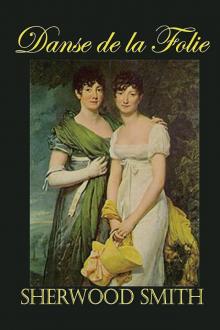 Danse De La Folie
Danse De La Folie King's Shield
King's Shield Whispered Magics
Whispered Magics Fleeing Peace
Fleeing Peace Barefoot Pirate
Barefoot Pirate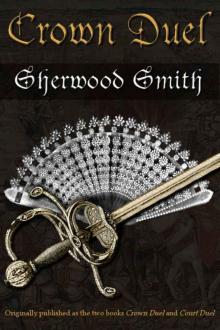 Crown Duel
Crown Duel Mearsies Heili Bounces Back
Mearsies Heili Bounces Back Commando Bats
Commando Bats A Stranger to Command
A Stranger to Command Lhind the Spy
Lhind the Spy The Spy Princess
The Spy Princess Blood Spirits
Blood Spirits Sasharia en Garde
Sasharia en Garde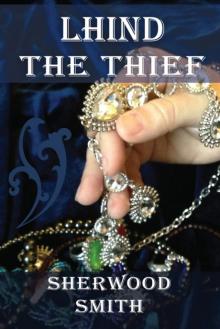 Lhind the Thief
Lhind the Thief Paradise Drift
Paradise Drift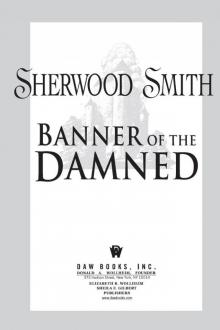 Banner of the Damned
Banner of the Damned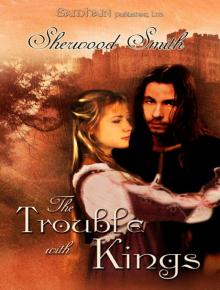 The Trouble With Kings
The Trouble With Kings Poor World
Poor World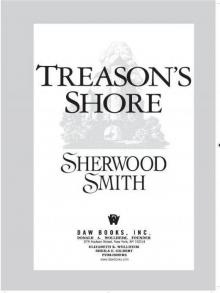 Treason's Shore
Treason's Shore Wren Journeymage
Wren Journeymage A Posse of Princesses
A Posse of Princesses Revenant Eve
Revenant Eve Once a Princess
Once a Princess Time of Daughters I
Time of Daughters I Rondo Allegro
Rondo Allegro Coronets and Steel
Coronets and Steel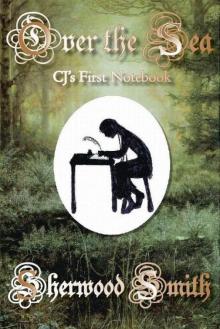 Over the Sea
Over the Sea Senrid
Senrid Hunt Across Worlds
Hunt Across Worlds A Sword Named Truth
A Sword Named Truth The Fox
The Fox Twice a Prince
Twice a Prince Fair Winds and Homeward Sail: Sophy Croft's Story
Fair Winds and Homeward Sail: Sophy Croft's Story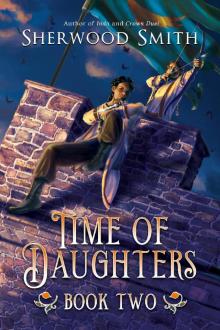 Time of Daughters II
Time of Daughters II The Rifter's Covenant
The Rifter's Covenant The Phoenix in Flight
The Phoenix in Flight Stranger
Stranger The Thrones of Kronos
The Thrones of Kronos A Prison Unsought
A Prison Unsought Twice a Prince: Sasharia En Garde Book 2
Twice a Prince: Sasharia En Garde Book 2